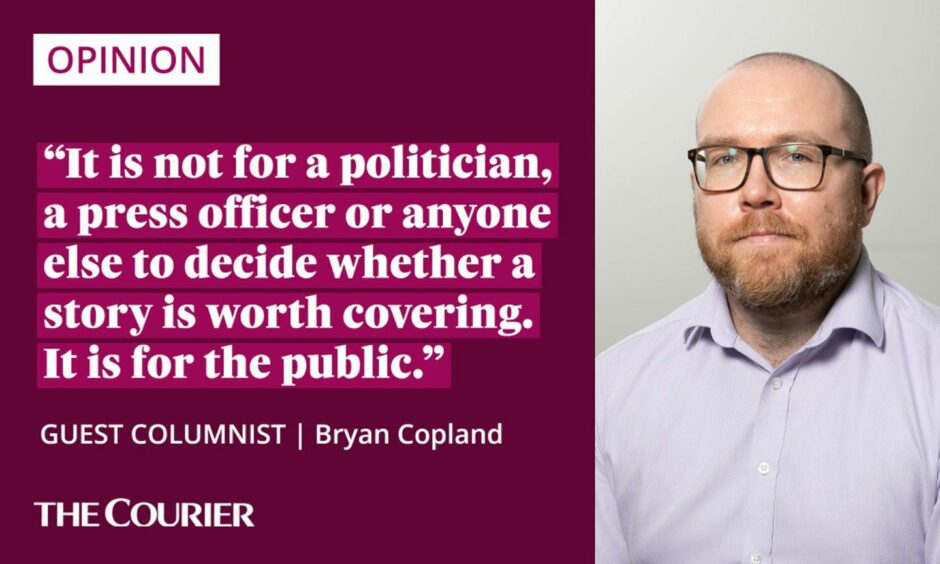“It’s a non-story.”
For journalists, those words are like a red rag to a bull.
We get on well with many press officers but our relationships with some can be tumultuous.
These are often former journalists or marketing professionals whose job is to promote the interests of the organisation or company they work for.
But their job is also to protect their employer’s reputation.
So when we approach them about a story that may paint them in a bad light, they can sometimes go on the defensive.

“It’s a non-story,” many of them will say.
In a journalist’s eyes that is code for “it’s definitely a story” because it indicates there is something to hide.
Why wouldn’t they engage otherwise?
But what is and what isn’t a “story”?
Sorry Jacob-Rees Mogg – Partygate is not a ‘non-story’
In short, a story is something that the public is interested in.
No news organisation survives if it is not serving its audience’s interests.
In this digital age, we can tell more easily than ever what our audiences do and don’t want to read about.
And collectively, those working in the UK’s media have spent hundreds of years getting to know their readers.
When Jacob Rees-Mogg proclaimed that the ongoing anger over Partygate fines was a “non-story” on BBC Breakfast on Friday, it told us a lot.
"I think this is a non-story"
Asked about the latest round of fines for Covid rule-breaking in Downing Street, Conservative MP Jacob Rees-Mogg says: "We need to look at whether these rules were right in the first place"https://t.co/nULnD7Bb9S pic.twitter.com/eATPgvwdbF
— BBC Politics (@BBCPolitics) May 13, 2022
It was the last resort of someone who has run out of ways of trying to justify the behaviour of his colleagues.
And they were the words of a man who is out of touch with the public.
Jacob Rees-Mogg tried to claim things have moved on since Partygate first emerged a few months ago.
But he failed to back up that claim, moaning about how the BBC had “loved” covering the story.
Well, yes, those Beeb journalists will have thrived off this – just like any reporter with a juicy tale to cover.
But it is only juicy if the public demand exists.
And in attacking the BBC, Jacob Rees-Mogg was attacking the millions of people who have consumed – and been disgusted by – the Partygate affair.
Still plenty of public appetite for this one
Content surrounding the scandal continues to provoke big reactions.
ITV journalist Paul Brand – who has been at the forefront of Partygate coverage – tweeted news of the latest round of fines on Twitter on Thursday, with more than 30,000 people ‘liking’ his post.
Nothing else he has posted in recent days has come close to that.
And the disgust expressed by restaurant critic Jay Rayner on Friday, over a bottle of Champagne signed by the prime minister – apparently a “souvenir” of Partygate – attracted a similar response.
Perhaps you thought the Conservative party took partygate seriously. Last night a champagne bottle signed by @BorisJohnson was donated to a charity event in Hertfordshire by local MP and Tory party chairman @OliverDowden. Read the description. pic.twitter.com/FtjgvKcYKS
— Jay Rayner (@jayrayner1) May 13, 2022
I realise this is not a forensic look at how engaged the public are in this story.
But you barely need to scratch the surface to see people continue to be outraged by it.
Should we be surprised by Jacob Rees-Mogg’s latest dismissal of Partygate? Not in the slightest.
I doubt many people reading this could say they have much – if anything – in common with the Tory MP, who seems to be an outlier in a party of outliers.
However, that “non-story” claim irked me.
That’s a lot of interest for a ‘non-story’
It is not for a politician, a press officer or anyone else to decide whether a story is worth covering.
That is for the public – and we, the media, as their representatives.
It is exactly why the Wagatha Christie story is getting such traction.
Two footballers’ wives going at it in a court room: of course, it is insignificant compared to the war in Ukraine, the cost of living crisis and all the other serious things that critics will remind us that we should be reporting on instead.
But ask any of the major media organisations what their most popular stories have been this week and Vardy v Rooney would be right up there.
Just like Partygate before it – and most likely after it too.











Conversation